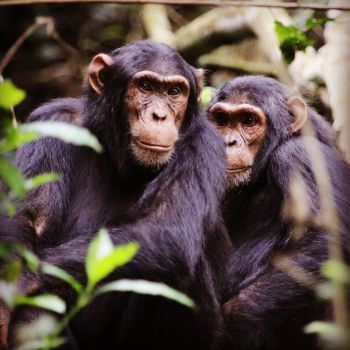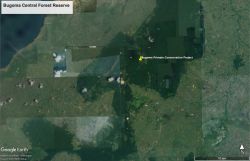Bugoma Central Forest Reserve
East Africa > Uganda > Bugoma Central Forest Reserve
Français | Português | Español | Bahasa Indonesia | Melayu
Summary









- Eastern chimpanzees (Pan troglodytes schweinfurthii) are present in Bugoma Central Forest Reserve.
- The chimpanzee population size is unknown; the density in 2006 was 1.99 individuals per km².
- The chimpanzee population trend is unknown.
- The site has a total size of 400 km².
- Key threats to chimpanzees are hunting and clearing land for agriculture.
- Conservation activities have focused on providing clean water access and raising conservation awareness.
Site characteristics
Table 1. Basic site information for Bugoma Central Forest Reserve
| Species | 'Pan troglodytes schweinfurthii |
| Area | 400 km² |
| Coordinates | Lat: 1.304 , Lon: 31.016 |
| Type of site | Protected area (Forest Reserve) |
| Habitat types | Subtropical/tropical moist lowland |
| Type of governance |
IUCN habitat categories Site designations
Ape status
In 2006, the density of chimpanzees was estimated to be 1.99 chimpanzees/km² (Plumptre & Cox 2006).
Table 2. Ape population estimates reported for Bugoma Central Forest Reserve
| Species | Year | Occurrence | Encounter or vistation rate (nests/km; ind/day) | Density estimate [ind./ km²] (95% CI) | Abundance estimate (95% CI) | Survey area | Sampling method | Analytical framework | Source | Comments | A.P.E.S. database ID |
|---|---|---|---|---|---|---|---|---|---|---|---|
| Pan troglodytes schweinfurthii | 2006 | 1.99 | Bugoma Forest | Line transects | Plumptre & Cox 2006 | Survey effort: 511.2 km |
Threats
Table 3. Threats to apes reported for Bugoma Central Forest Reserve
| Category | Specific threats | Threat level | Description | Year of threat |
|---|---|---|---|---|
| 1 Residential & commercial development | Absent | |||
| 3 Energy production & mining | Absent | |||
| 6 Human intrusions & disturbance | Absent | |||
| 7 Natural system modifications | Absent | |||
| 9 Pollution | Absent | |||
| 10 Geological events | Absent | |||
| 12 Other threat | Absent | |||
| 2 Agriculture & aquaculture | 2.1 Annual & perennial non-timber crops | Present (unknown severity) | Encroachment of forest habitat for farming affecting the boundaries (Hobaiter & Gruber pers. comm. 2020). Sugarcane companies are clearing land within the reserve (Lewton 2020). | Ongoing (2020) |
| 4 Transportation & service corridors | 4.1 Roads & railroads | Present (unknown severity) | Busy dirt road cuts through the main forest block and divides chimpanzees' (and other species') territory - danger from speeding vehicles (Hobaiter & Gruber pers. comm. 2020). | Ongoing (2020) |
| 5 Biological resource use | 5.1 Hunting & collecting terrestrial animals | Present (unknown severity) | Snares placed for duiker and bush pigs also trap chimpanzees. Chimpanzees are also directly targeted by hunters (Hobaiter & Gruber pers. comm. 2020). | Ongoing (2020) |
| 5 Biological resource use | 5.3 Logging & wood harvesting | Present (unknown severity) | Illegal logging is present throughout forest, in particular outside of the immediate research areas; includes chimpanzee feeding species. Trees illegally felled for charcoal burning and firewood, particularly around the boundaries (Hobaiter & Gruber pers. comm. 2020). | Ongoing (2020) |
| 8 Invasive & other problematic species, genes & diseases | 8.4 Pathogens | Present (unknown severity) | Respiratory outbreaks. Other sites in Uganda have confirmed similar respiratory pathogens of human origin (Hobaiter & Gruber pers. comm. 2020). | Ongoing (2020) |
| 11 Climate change & severe weather | 11.1 Habitat shifting & alteration | Present (unknown severity) | Some evidence that there is decreasing fruiting in forest trees, perhaps impacted by increase in overnight temperature lows (Hobaiter & Gruber pers. comm. 2020). | Ongoing (2020) |
Conservation activities
The Bugoma Primate Conservation Project was established in 2015, and works in collaboration with local communities surrounding the reserve on a number of conservation activities, including school classes, plastic waste recycling, and clean water programs.
Table 4. Conservation activities reported for Bugoma Central Forest Reserve
| Category | Specific activity | Description | Implementing organization(s) | Year of activity |
|---|---|---|---|---|
| 4 Education & awareness | 4.5 Implement multimedia campaigns using theatre, film, print media, discussions | The Bugoma Primate Conservation Project visits local schools and communities to talk about the Bugoma Forest, and hold conservation film nights (Bugoma Primate Conservation Project n.d.) | Ongoing | |
| 5 Protection & restoration | 5.2 Legally protect ape habitat | Ongoing | ||
| 7 Economic & other incentives | 7.2 Provide non-monetary benefits to local communities for sustainably managing their forest and its wildlife (e.g., better education, infrastructure development) | Clean water access program (Bugoma Primate Conservation Project n.d.) | Ongoing |
Conservation activities list (Junker et al. 2017)
Challenges
Table 5. Challenges reported for Bugoma Central Forest Reserve
| Challenges | Specific challenges | Source | Year(s) |
|---|---|---|---|
| 6 Safety and stability | 6.3 Civil unrest/war | Hobaiter & Gruber pers. comm. 2020 |
Enablers
Table 6. Enablers reported for Bugoma Central Forest Reserve
| Enablers | Specific enablers | Source | Year(s) |
|---|---|---|---|
| 1 Site management | |||
| 2 Resources and capacity | |||
| 3 Engaged community | |||
| 4 Institutional support | |||
| 5 Ecological context | |||
| 6 Safety and stability |
Research activities
Following initial surveys in 2015, systematic habituation of chimpanzee communities started in 2016 and is ongoing. Several groups of Ugandan mangabey are already habituated. Systematic data collection on chimpanzee behaviour, forest tree phenology, illegal activities, rainfall, and temperature are collected by the Bugoma Primate Conservation Project.
Documented behaviours
Table 7. Behaviours documented for Bugoma Central Forest Reserve
| Behavior | Source |
|---|---|
| Not reported |
Exposure to climate change impacts
External links
Bugoma Primate Conservation Project
Bugoma Primate Conservation Project on Twitter
Relevant datasets
References
Lewton, T. (2020, November 5). Uganda environment authority greenlights clearing of Bugoma Forest. Online: https://news.mongabay.com/2020/11/uganda-environment-authority-greenlights-clearing-of-bugoma-forest/
Plumptre, A.J., & Cox, D. (2006). Counting primates for conservation: primate surveys in Uganda. Primates, 47, 65-73.
Bugoma Primate Conservation Project (n.d.) Retrieved from: https://bugomaprimates.wp.st-andrews.ac.uk/research/
Page created by: Cat Hobaiter & Thibaud Gruber Date: NA

